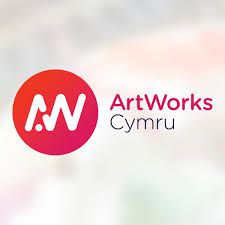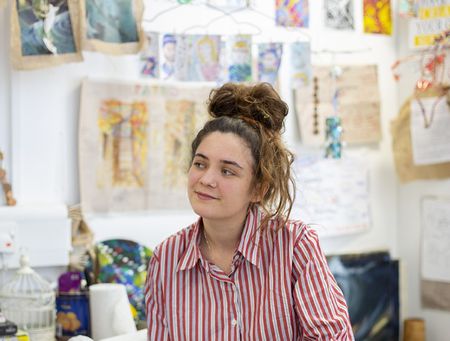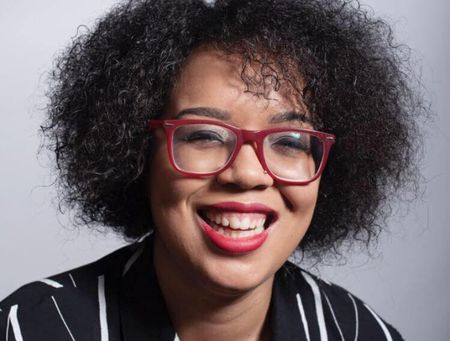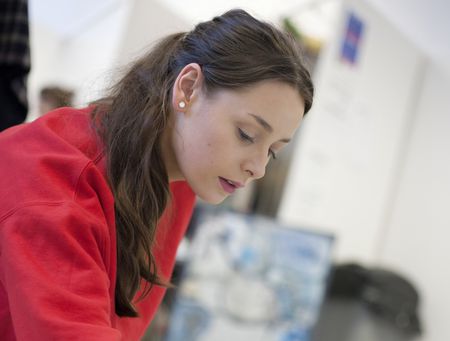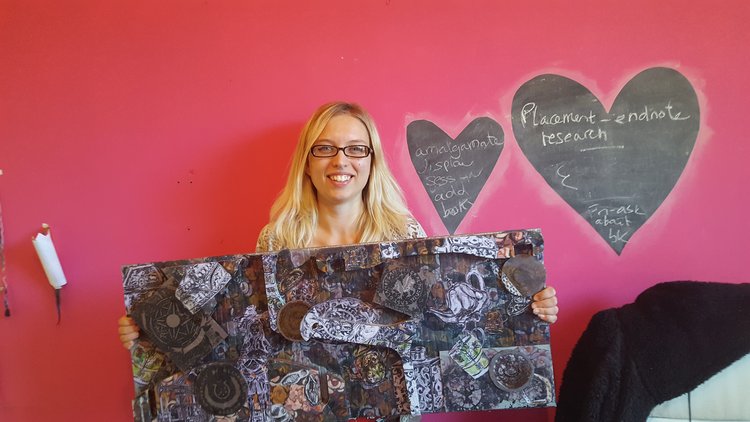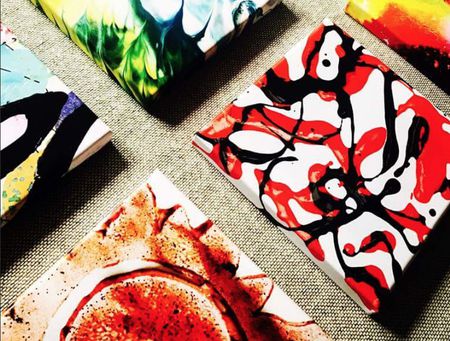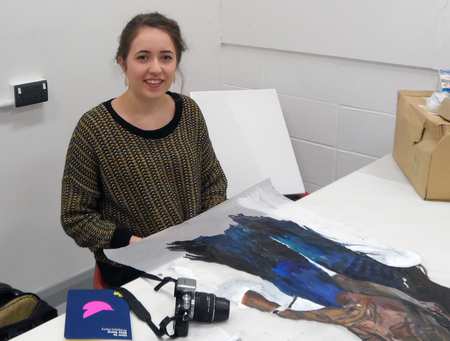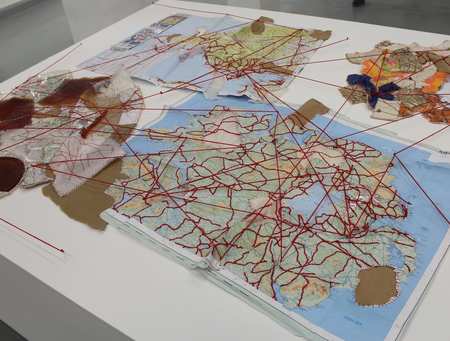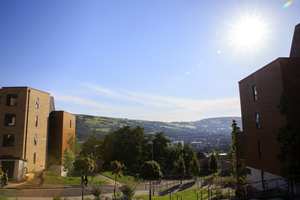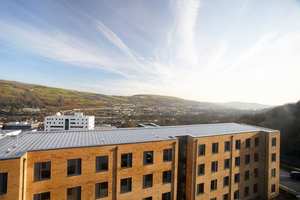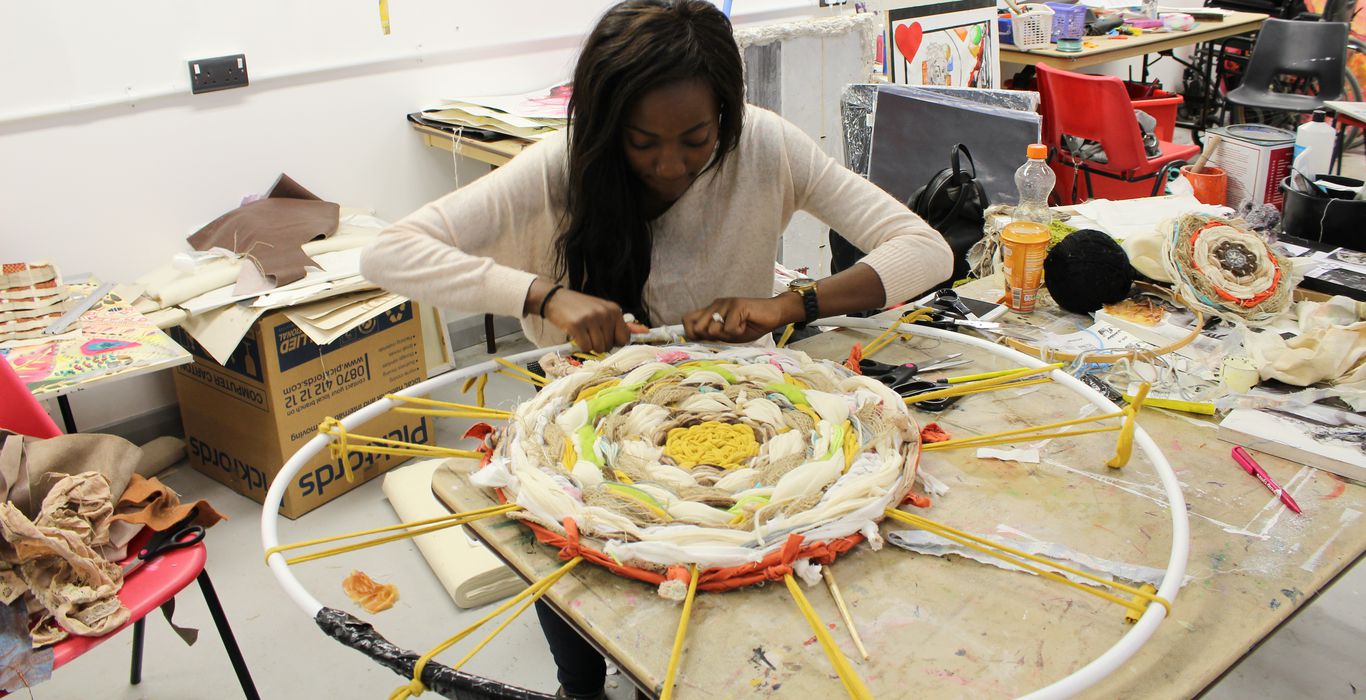
BA (Hons) Creative and Therapeutic Arts
If you're passionate about expressive arts and believe in the potential for creative practices to improve wellbeing, the Creative and Therapeutic Arts degree provides the opportunity to develop your future practice in community and educational settings.
Whether you're interested in fine art, design, craft or creative community engagement, the Creative and Therapeutic Arts course encompasses a wide variety of creative disciplines. You'll be taught by experts at the forefront of the creative and therapeutic arts workforce, who will provide you with an excellent platform to gain experience of working creatively with others.
The Creative and Therapeutic Arts degree has three distinct areas of study - art practice, professional practice placement, and theoretical input. You'll be encouraged to make meaningful connections between each core subject to become a creative arts practitioner.
Follow Creative and Therapeutic Arts on Twitter and Instagram.
Year One: Creative and Therapeutic Arts Degree
Your first year focuses on building a creative learning community among your fellow students to support you throughout your studies. You’ll work independently and collaboratively, sharing knowledge and constructively critiquing each other’s work. You’ll also engage in an intensive project of professional engagement and training. This will culminate in expressive arts workshops in the community through collaborative working.
- Art (1)
- Professional Practice (1)
- Creativity and Wellbeing: Theoretical Underpinnings
- Academic Skills for Inclusive Practice
Year Two: Creative and Therapeutic Arts Degree
In the second year, you’ll have opportunities to diversify. Theoretical modules offer insight into a range of specialist contexts and ideas on how to work creatively within these, as well as exploring the nature of collaboration and participation. This learning is developed, applied and assessed while you work creatively and therapeutically on a placement.
- Art (2)
- Professional Practice/Placement (2)
- Working Creatively to Facilitate Wellbeing
Year Three: Creative and Therapeutic Arts Degree
The final year provides scope for you to hone your identity as a creative arts practitioner. You’ll learn about the importance of evidence-based practice and evaluation, and refine your chosen specialist area through further placement opportunities in community, education and health settings. This year ends with a graduate exhibition, which has a keen focus on the therapeutic and inclusive potential of this practice.
- Art (3)
- Critical Reflection of Therapeutic Principles
- Evidence-based practice
- Professional Practice/Placement
Teaching
You will take part in collaborative classes, workshops and lectures as well as learning through work-based placements in a range of community, educational and health settings.
Find out more about our current research into learning disabilities and developmental disorders.
Assessment
Assessment methods on the course are varied and are typically coursework and practical in orientation. Assessment consists of coursework, essays, peer presentations, creative and therapeutic peer workshops, independent study and professional work on placement.
There are no examinations within the Creative and Therapeutic Arts programme.
Placements
The Creative and Therapeutic Arts team are keen to encourage students to become involved with working with a wide range of groups in order to broaden their experience and understanding while on the degree.
Placements form an important part of this expressive arts degree and our partnerships with a range of settings mean you will gain a wealth of practitioner experience to boost your CV.
Placement partnerships include opportunities in community settings, such as charities, women’s refuges, children’s play therapy settings, nursing homes, learning disability services, centres for refugees and asylum seekers, social groups for adults with dual sensory impairments, and more. We also have partnerships with over 50 schools and learning centres with a breadth of innovative and specialist provision.
Facilities
We have a multipurpose teaching space where most of the art and related lectures are taught. There is scope for workshops, more messy experimental work, as well as lectures and seminars in this space. There is also dedicated studio space which students will have opportunity to access at specific points during their studies, for specific projects.
The Creative and Therapeutic Arts course has its own range of specialist tools and resources which are used through the teaching within these dedicated spaces.
Lecturers
- Laura Welsman, course leader
- Becky Davies
- Heloise Godfrey-Talbot
- Lisset Burrett
- Sarah Challenger
- Mike Kay
We regularly revalidate courses for quality assurance and enhancement
At USW, we regularly review our courses in response to changing patterns of employment and skills demand to ensure we offer learning designed to reflect today’s student needs and tomorrow’s employer demands.
If during a review process course content is significantly changed, we’ll write to inform you and talk you through the changes for the coming year. But whatever the outcome, we aim to equip our students with the skillset and the mindset to succeed whatever tomorrow may bring. Your future, future-proofed.
Contextual offers
We may make you a lower offer based on a range of factors, including your background (where you live and the school or college that you attended for example), your experiences and individual circumstances (as a care leaver, for example). This is referred to as a contextual offer and we receive data from UCAS to support us in making these decisions. USW prides itself on its student experience and we support our students to achieve their goals and become a successful graduate. This approach helps us to support students who have the potential to succeed and who may have faced barriers that make it more difficult to access university. Here is a link to our Contextual Admissions Policy.
Other qualifications and experience
We can also consider combinations of qualifications and other qualifications not listed here may also be acceptable. We can sometimes consider credits achieved at other universities and your work/life experience through an assessment of prior learning. This may be for year one entry, or advanced entry to year two or three of a course where this is possible.
To find out which qualifications have tariff points, please refer to the UCAS tariff calculator.
If you need more help or information or would like to speak to our friendly admissions team, please contact us here
Additional Requirements
September 2024 entry
You will be required to produce a portfolio of work, which should be no less than 20 pages, demonstrating your art practice. If you have not previously studied art in a formal education setting, it is recommended that you consider pursuing art classes, night school and/or independent studio practice to strengthen your portfolio and application.
An Enhanced Disclosure and Barring Service (DBS) check on the Child & Adult Workforce and Child Barring List and subscription to the DBS Update Service. (Overseas equivalent required for non-uk applicants)
Typical A-Level Offer
BCC to exclude General Studies and normally include A Level Art, an Art & Design Foundation Diploma or a relevant background (this is equivalent to 104 UCAS tariff points).
Typical Welsh BACC Offer
Pass the Advanced Welsh Baccalaureate Diploma with Grade C/B in the Skills Challenge Certificate and BC - CC at A Level, to exclude General Studies, and normally include A Level Art, an Art & Design Foundation Diploma or a relevant background (this is equivalent to 104 UCAS tariff points).
Typical BTEC Offer
BTEC Extended Diploma Distinction Merit Merit and normally include an Art subject or an Art & Design Foundation Diploma or a relevant background
Typical Access to HE Offer
Pass the Access to HE Diploma with a minimum of 104 UCAS tariff points in an Art related Access or hold an Art & Design Foundation Diploma or a relevant background.
Additional Requirements
GCSEs: The University normally requires a minimum 5 GCSEs including Mathematics/Numeracy and English at Grade C or Grade 4 or above, or their equivalent, but consideration is given to individual circumstances.
International Entry Requirements
We also welcome international applications with equivalent qualifications. Please visit the country specific pages on our international website for exact details.
English Requirements
In general, international applicants will need to have achieved an overall IELTS grade of 6.0 with a minimum score of 5.5 in each component.
However, if you have previously studied through the medium of English IELTS might not be required, but please visit the country specific page on our international website for exact details. If your country is not featured please contact us.
Full-time fees are per year. Part-time fees are per 20 credits. Once enrolled, the fee will remain at the same rate throughout the duration of your study on this course
August 2024 - July 2025 Fees
Full-time UK: £9000
Full-time International: £15260
August 2025 - July 2026 Fees
Full-time UK: TBC
Full-time International: TBC
Student Perks
At the University of South Wales, you’re investing in so much more than a degree. We strive to provide our students with the best possible experience, no matter what you chose to study. Whether it’s access to top of the range mac books and PCs, state-of-the-art facilities packed with industry-leading equipment and software, masterclasses and events led by industry experts, or a wide range of clubs and societies to meet likeminded people, better tomorrows start with extra perks.
Each course also has their own unique student benefits to prepare you for the real word, and details of these can be found on our course pages. From global field trips, integrated work experience and free course-related resources, to funded initiatives, projects working with real employers, and opportunities for extra qualifications and accreditations - at USW your future, is future-proofed.
Click here to learn more about student perks at USW.
Additional Costs
As a student of USW, you’ll have access to lots of free resources to support your study and learning, such as textbooks, publications, online journals, laptops, and plenty of remote-access resources. Whilst in most cases these resources are more than sufficient in supporting you with completing your course, additional costs, both obligatory and optional, may be required or requested for the likes of travel, memberships, experience days, stationery, printing, or equipment.
* Obligatory
| Item | Cost | |
|---|---|---|
| Kit (uniform and equipment) | £250 - £1000 | Art materials for projects. Cost varies depending on individual projects |
| Field trips | £150 - £300 | Typically in Year 1 |
| Additional assessment or memberships: Disability assessments | £300 - £350 | Where needed some grants are available through the University as well as application to the Hardship Fund |
| DBS * | £55.42 | This fee includes £40 for the enhanced DBS certificate, the Post Office Administration fee and the online administration fee. |
| DBS Updating Service * | £13 | Whilst optional at present, we strongly recommend you sign up for this service, especially if you are likely to have placements each year and wish to pursue a career post University where a DBS check is a requirement. Please note you must register with the update service within 30 days of your enhanced DBS certificate being issued. |
| Other: Portfolio | £80 - £100 | For graduate exhibition |
| Other: Art workbooks/printing/placement files | £25 - £100 | You will need to pay for your work books and printing costs. |
| Other: Placement travel | £60 - £100 | Dependent on length and location of placement |
| Other: SignAlong manual | £16 - £24 | If you wish to purchase a manual to accompany your study of this accredited SignAlong course |
| Site visits * | £10 - £30 | Visits to community settings, undertaken as part of taught modules, where students engage in their assessed project activities.
|
Funding
Funding to help pay for (or cover) course tuition fees and living costs
Whilst you’re studying, you’ll have two main financial obligations – tuition fees and living costs. There’s lots of financial help available from the University of South Wales and external funding sources, that may provide loans (which have to be paid back) and grants, scholarships and bursaries (that don't).
To learn about course fees, funding options, and to see if you are eligible for financial support, visit our Fees and Funding pages.
UK students
Apply via UCAS if you are a UK residing applicant, applying for year one of a full-time undergraduate degree, Foundation Year, Foundation Degree or HND and you have not applied through UCAS before. If you are applying to study part-time, to top up your Foundation Degree or HND, or to transfer to USW from another institution, please apply directly. Please read our useful interview tips and portfolio guide before you apply.
International and EU students
Apply directly to the University if you live outside the UK.
Employment opportunities exist within education, health and the third sector, including community arts projects.
This Creative and Therapeutic Arts degree is a potential pathway to postgraduate study, including the MA Art Psychotherapy leading to Health and Care Professions Council (HPC) registration as an Art Psychotherapist. Students have also progressed to the MA Arts Practice (Arts, Health and Wellbeing) as well as developing their own companies and freelance practices.
Our Careers and Employability Service
As a USW student, you will have access to advice from the Careers and Employability Service throughout your studies and after you graduate.
This includes: one-to-one appointments from faculty based Career Advisers, in person, over the phone or even on Skype and through email via the "Ask a Question" service. We also have extensive online resources for help with considering your career options and presenting yourself well to employers. Resources include psychometric tests, career assessments, a CV builder, interview simulator and application help. Our employer database has over 2,000 registered employers targeting USW students, you can receive weekly email alerts for jobs.
Our Careers service has dedicated teams: A central work experience team to help you find relevant placements; an employability development team which includes an employability programme called Grad Edge; and an Enterprise team focused on new business ideas and entrepreneurship.

